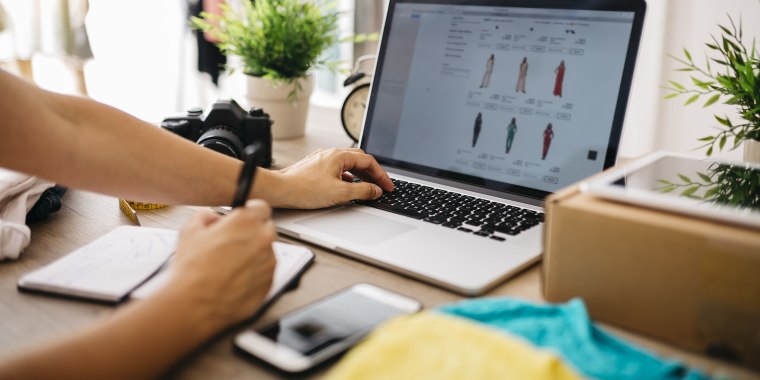If you're working from home during the coronavirus pandemic, chances are, you're sitting in front of your computer for hours at a time every day. The internet can be distracting during the workday, especially when your favorite retailers bombard your inbox with promotions and discounts. And, with coronavirus relief checks coming in, you might have some extra cash on hand.
Online shopping during the pandemic is sometimes necessary, particularly for essentials like groceries, medicine and toiletries. But that means it's tempting to justify some extra spending — on workout clothes, for example, since that's all we're wearing these days, or a new beauty mask as a quick pick-me-up.
If retail therapy has become a crutch during the pandemic, here's how to curb those temptations or shop smartly if you need to.
Imagine the money you'll save if you don't make a purchase.
Bobbi Rebell, co-host of the podcast "Money With Friends" and personal finance expert at the app Tally, says it's important to save as much as you can, and now is a perfect time to start an emergency fund. "No one is ever going to regret having too much money in the bank," she told TODAY.
Tori Dunlap, founder of Her First 100K, a financial website for millennial women, likes to visualize a bigger reward before making an impulse buy. "When I'm thinking about buying something that might be $100, I might think... well, that $100 could also get me a future plane ticket from Washington to California," she told TODAY. Ultimately, it's about thinking in broader financial strokes and understanding what you prioritize in your finances.
Give yourself some time to think about a purchase.
It might feel good to make a quick purchase to cure our momentary woes — it's an act we often believe will help us feel better. But the feeling is usually fleeting. So before making a purchase, take some time to step away from the computer to distract your mind. Dunlap says she finds it useful to wait 24 hours to make a purchase; if she's still thinking about it 24 hours after she sees it, it's usually OK to buy it.
Additionally, Rebell says that taking a walk or doing some sort of physical activity will probably bring your serotonin levels up more than another Amazon purchase. You can also FaceTime or Zoom friends and family members.
Don't feel ashamed of online shopping.
Even if you've unsubscribed from all promotional emails, no one is immune to the temptation to press the "add to cart" button, says Dunlap. Both experts agree that there is nothing inherently wrong with shopping in order to emotionally cope, as long as it's in moderation.
"They call it retail therapy for a reason," said Rebell. And, since you're probably spending more time shopping online these days, it might be OK to splurge on something you need at home, as long as it's in your budget, Rebell says. "For example, I've never worn slippers at home. But now, I'm home a lot and I'm tired of walking around barefoot," she said. "So maybe my splurge is going to be a new pair of comfy slippers."
Use tools to find discounts and rack up points.
Rebell says there are other ways you can try to save a few bucks if you're going to be shopping online anyway. By using Google Chrome shopping extensions like Honey or eBates, you can see if there are any deals that you might be missing, and you can potentially get a certain percentage of cash back for your purchase.
You can also use price-tracking sites and apps to make sure you get the best price. Camelcamelcamel monitors Amazon's dynamic pricing, so you can review historical changes. You can also set a specific threshold on a product, and the site will alert you of a price drop. Shoptagr is another tool that tracks pricing across thousands of sites. Both services are free.
Dunlap also recommends using your credit card if you're a responsible credit card user and you know you'll be paying your monthly bill in full. "You may as well be getting points, miles or cash back for your purchases," she said.


